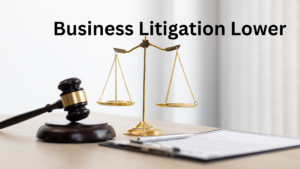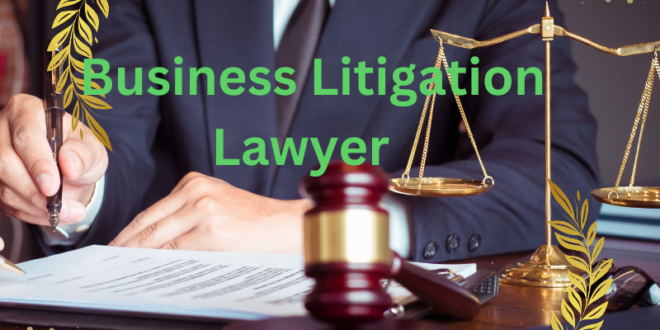Business Litigation Lawyer
A business litigation lawyer is a legal professional who specializes in handling disputes and lawsuits related to business matters. They provide legal representation and advice to businesses and business owners involved in various types of disputes, such as contract disputes, intellectual property disputes, employment disputes, partnership disputes, and more.
The role of a Business litigation lawyer typically involves:
- Case Evaluation: Reviewing the details of the case, gathering evidence, and assessing the strengths and weaknesses of the client’s position.
- Legal Research: Conducting extensive research on relevant laws, regulations, and legal precedents that may apply to the case.
- Strategy Development: Developing a legal strategy to achieve the client’s objectives, whether it’s through negotiation, settlement, or litigation.
- Document Preparation: Preparing legal documents, such as complaints, motions, briefs, and other court filings necessary for the case.
- Negotiation and Settlement: Attempting to resolve the dispute through negotiation and settlement discussions, aiming to reach a favorable outcome for the client without going to trial.
- Representation in Court: If the case proceeds to trial, the business litigation lawyer will represent the client in court, presenting arguments, examining witnesses, and advocating for the client’s interests.
- Appeals: Handling appeals if either party seeks to challenge a decision made at the trial court level.
It’s worth noting that business litigation lawyers can work for law firms, in-house legal departments of corporations, or as solo practitioners. They need to have a strong understanding of business law, excellent negotiation and advocacy skills, and the ability to navigate complex legal issues to effectively represent their clients in business-related disputes.
Certainly! Here are some additional aspects to consider when it comes to business litigation lawyers:
- Alternative Dispute Resolution (ADR): Business litigation lawyers are well-versed in alternative dispute resolution methods, such as mediation and arbitration. These processes provide alternatives to traditional litigation and can be more cost-effective and time-efficient. Lawyers may represent their clients during ADR proceedings and help negotiate favorable settlements.
- Business Counseling: In addition to handling disputes, business litigation lawyers often provide general legal advice and counsel to businesses. They can help companies navigate legal issues, draft contracts and agreements, review business practices for compliance, and minimize potential legal risks.
- Industry-Specific Knowledge: Some business litigation lawyers specialize in particular industries, such as technology, healthcare, finance, or construction. This specialized knowledge allows them to understand the specific legal challenges and regulations that businesses in those industries face, providing targeted advice and representation.
- Preemptive Measures: Business litigation lawyers can also assist businesses in taking preemptive measures to minimize the risk of litigation. They may conduct legal audits, review contracts and policies, and identify potential areas of vulnerability or non-compliance. By addressing these issues proactively, businesses can reduce the likelihood of disputes arising in the first place.
- Collaborative Approach: While litigation can be necessary in certain cases, business litigation lawyers often strive to resolve disputes amicably and minimize the impact on their clients’ business operations. They may explore negotiation, settlement, and alternative resolution methods to achieve the most favorable outcome without the need for lengthy court battles.
- Expert Network: Business litigation lawyers often work closely with a network of experts, such as forensic accountants, industry specialists, and investigators. These professionals can provide valuable insights and assistance in complex cases by analyzing financial records, assessing damages, or providing expert testimony.
Remember that laws and regulations can vary by jurisdiction, so it’s important for businesses to engage a business litigation lawyer who is familiar with the relevant laws in the specific jurisdiction where the dispute arises.


Certainly! Here are a few more points to consider:
- Risk Assessment: Business litigation lawyers assist clients in assessing the potential risks and benefits associated with pursuing or defending a legal claim. They can provide an analysis of the strengths and weaknesses of a case, helping clients make informed decisions about whether to proceed with litigation or explore alternative options.
- Class Action Defense: In cases where a business is facing a class action lawsuit, a business litigation lawyer can provide defense strategies and represent the business’s interests. They will navigate the complexities of class action litigation, protect the business’s reputation, and work towards minimizing potential damages.
- Regulatory Compliance: Business litigation lawyers can help businesses ensure compliance with applicable laws and regulations. They can provide guidance on matters such as data privacy, consumer protection, employment laws, and industry-specific regulations, reducing the risk of regulatory violations and associated legal consequences.
- Dispute Resolution Clause Drafting: When businesses enter into contracts or agreements, business litigation lawyers can assist in drafting dispute resolution clauses that outline the procedures to be followed in case of a dispute. These clauses may include provisions for mediation, arbitration, or other forms of alternative dispute resolution, promoting efficient and cost-effective resolution methods.
- International Business Disputes: For businesses involved in international trade or with cross-border operations, business litigation lawyers with expertise in international law can provide assistance in resolving disputes that span multiple jurisdictions. They can navigate complex legal frameworks, handle jurisdictional issues, and coordinate with legal professionals in different countries.
- Reputation Management: In the age of social media and online reviews, businesses facing litigation may also need assistance with reputation management. Business litigation lawyers can work in conjunction with public relations professionals to develop strategies to protect and restore a business’s reputation during and after legal proceedings.
- Cost Management: Business litigation can be expensive. Business litigation lawyers can help clients manage costs by providing cost estimates, exploring alternative fee arrangements, and advising on cost-effective strategies to resolve disputes.
Business litigation lawyers play a crucial role in protecting the legal interests of businesses and helping them navigate the complexities of commercial disputes. By leveraging their expertise, businesses can mitigate risks, resolve disputes efficiently, and focus on their core operations.
Certainly! Here are a few more points to consider:
- Insurance Coverage: Business litigation lawyers can assist businesses in evaluating their insurance policies and determining if coverage exists for the specific dispute. They can work with insurance providers to ensure proper coverage is obtained and assist in filing claims when necessary.
- Intellectual Property Protection: Business litigation lawyers can help businesses protect their intellectual property rights, such as patents, trademarks, copyrights, and trade secrets. In cases of infringement or misappropriation, they can enforce these rights through litigation, negotiate settlements, or pursue other appropriate legal remedies.
- Fraud and Misrepresentation Claims: If a business is facing allegations of fraud or misrepresentation, business litigation lawyers can provide defense strategies and represent the business’s interests. They will investigate the claims, gather evidence, and present a strong defense to protect the business’s reputation and financial interests.
- Restrictive Covenants and Non-Compete Agreements: Business litigation lawyers can assist businesses in drafting and enforcing restrictive covenants and non-compete agreements to protect their trade secrets, customer relationships, and confidential information. In case of violations, they can pursue legal action to enforce these agreements and seek appropriate remedies.
- Dissolution and Business Disputes: In cases involving partnership disputes or business dissolution, business litigation lawyers can help businesses navigate complex legal issues related to ownership rights, asset distribution, and financial obligations. They can represent clients in negotiation, mediation, or litigation to achieve a fair resolution.
- Compliance Investigations: Business litigation lawyers can conduct internal investigations for businesses to identify potential legal violations and develop strategies to mitigate risks. They can help businesses respond to government inquiries, regulatory audits, and investigations, ensuring compliance with applicable laws and regulations.
- Professional Ethics and Liability: Business litigation lawyers can advise businesses on professional ethics matters and potential liability issues. They can provide guidance on ethical obligations, help develop compliance programs, and represent businesses in legal malpractice claims if necessary.
- Post-Judgment Enforcement: If a business has obtained a favorable judgment but the opposing party fails to comply, business litigation lawyers can assist in enforcing the judgment. They can pursue collection actions, garnish wages, or take other legal measures to ensure the business receives the awarded damages or remedies.
It’s important to note that the specific services provided by a business litigation lawyer may vary depending on the nature of the dispute and the individual lawyer’s expertise. Engaging an experienced and specialized business litigation lawyer can greatly benefit businesses when facing legal challenges or disputes.
Small Business Bankruptcy Lawyer near me


To find a bankruptcy lawyer near you, I recommend using online resources and directories specific to your location. Here are a few suggestions on how you can find a small business bankruptcy lawyer:
- Online search engines: Perform a search using keywords like “small business bankruptcy lawyer” followed by the name of your city or region. This should provide you with a list of law firms or individual lawyers specializing in bankruptcy law near your location.
- Local bar association: Check the website of your local bar association. They often provide directories or referral services to help you find attorneys practicing in specific areas of law, including bankruptcy.
- Legal directories: Websites like Avvo (www.avvo.com) and Justia (www.justia.com) have comprehensive databases of attorneys in various practice areas. You can search for bankruptcy lawyers based on your location and read reviews from their previous clients.
- Recommendations: Seek recommendations from friends, family, or other business owners who may have dealt with similar situations. They might be able to refer you to a reputable bankruptcy lawyer.
Remember to research and vet potential lawyers before making a decision. Look for their experience in small business bankruptcy cases, reviews or testimonials from past clients, and consider scheduling a consultation to discuss your specific situation.
Please note that the information provided here is general in nature and not legal advice. Consulting with a bankruptcy lawyer who is familiar with the laws in your jurisdiction is the best way to receive guidance tailored to your specific circumstances.
Bankruptcy Lawyer Search
I’m sorry, but as an AI language model, I don’t have access to real-time information or the ability to browse the internet. Therefore, I can’t provide you with specific recommendations for a small business bankruptcy lawyer near your location.
However, I can suggest some general methods to find a small business bankruptcy lawyer near you:
- Referrals: Ask for recommendations from friends, family members, or other business owners who have gone through a similar situation. They may be able to recommend a reliable lawyer.
- Local Bar Association: Contact your local bar association or visit their website to get a list of bankruptcy lawyers practicing in your area. They often provide referral services that can help you find a suitable attorney.
- Online Directories: Utilize online directories such as Avvo, FindLaw, or Justia. These platforms allow you to search for bankruptcy lawyers by location and provide reviews and ratings from previous clients.
- Internet Search: Perform a simple internet search using keywords like “small business bankruptcy lawyer near me” or “business bankruptcy attorney [your location].” This will likely provide you with a list of lawyers in your area specializing in business bankruptcy.
Once you have compiled a list of potential lawyers, it’s a good idea to schedule consultations to discuss your specific situation and determine if they are the right fit for your needs.
Remember, it’s important to research and evaluate each lawyer before making a decision. Consider their experience, expertise in bankruptcy law, track record, and fees to ensure you choose a lawyer who can effectively represent your small business.
Certainly! Here are a few more steps to consider when searching for a small business bankruptcy lawyer near you:
Consultation and Evaluation: Schedule initial consultations with the lawyers on your list. During these meetings, discuss your specific circumstances and ask relevant questions about their experience, approach to handling bankruptcy cases, fees, and any other concerns you may have. This will give you a chance to evaluate their expertise and determine if they are a good fit for your needs.
- Specialization in Bankruptcy Law: Ensure that the lawyer you choose specializes in bankruptcy law and has experience dealing specifically with small business bankruptcies. Bankruptcy laws can be complex, and it’s crucial to work with a lawyer who has the necessary knowledge and expertise in this area.
- Reputation and Reviews: Research the reputation of the lawyers you are considering. Look for reviews and testimonials from previous clients, either on the lawyer’s website or on independent review platforms. This can give you insights into their professional conduct, communication skills, and success rate.
- Fee Structure: Discuss the lawyer’s fee structure during the initial consultation. Some lawyers may charge an hourly rate, while others may offer a flat fee for their services. Make sure you understand how they bill and what costs are involved. Additionally, consider whether the lawyer’s fees align with your budget.
- Trust and Communication: Pay attention to the lawyer’s communication style and how comfortable you feel discussing your business and financial matters with them. It’s crucial to work with a lawyer whom you trust and with whom you can establish open and clear communication throughout the bankruptcy process.
- Credentials and Bar Association Membership: Verify the lawyer’s credentials and ensure they are a member of the relevant bar association in your jurisdiction. This information can usually be found on their website or by contacting the bar association directly.
By following these steps, you can find a small business bankruptcy lawyer near you who is well-suited to handle your case and provide the legal guidance you need.
Certainly! Here are a few additional steps to continue your search for a small business bankruptcy lawyer:
- Local Business Networks: Reach out to local business networks, such as chambers of commerce or industry associations, and inquire about recommendations for bankruptcy lawyers. These organizations often have connections and resources that can help you find reputable lawyers who specialize in small business bankruptcies.
- Professional Referrals: Contact other professionals who work closely with businesses, such as accountants, financial advisors, or commercial real estate agents. They may be familiar with bankruptcy lawyers in your area and can provide valuable recommendations based on their expertise and industry connections.
- Online Forums and Communities: Explore online forums and communities where small business owners gather to share advice and experiences. These platforms, such as small business forums or industry-specific communities, can be a valuable source of information. You can ask for recommendations or see if other entrepreneurs have shared their experiences with bankruptcy lawyers in your area.
- Local Legal Aid Organizations: Check if there are any local legal aid organizations that provide assistance to small businesses. These organizations often have resources and can offer guidance or referrals to bankruptcy lawyers who may be able to help you within your financial constraints.
- Online Presence: Once you have narrowed down your options, research the shortlisted lawyers’ online presence. Visit their websites, review their professional profiles on LinkedIn or other platforms, and explore any articles or publications they may have written. This will give you further insights into their expertise and involvement in bankruptcy law.
Remember to exercise due diligence in your search, carefully assess the lawyers’ qualifications, and choose someone who understands the unique challenges of small business bankruptcy. It’s important to work with a lawyer who is experienced, knowledgeable, and has a track record of success in helping small businesses navigate the bankruptcy process.
Business Litigation Lawyer Salary
According to available data and industry insights, the average salary for a business litigation lawyer in the United States ranges from $85,000 to $200,000 per year. However, it’s important to note that salaries can significantly exceed this range for highly experienced and successful lawyers in large metropolitan areas or prestigious law firms.
Additionally, some business litigation lawyers may receive performance-based bonuses, which can further increase their overall compensation. These bonuses are often tied to factors such as billable hours, client development, and successful case outcomes.
It’s worth mentioning that salaries can also vary based on the economic conditions of the region and the demand for business litigation services in that area. Therefore, it’s advisable to conduct further research and consult reliable sources for the most up-to-date and accurate salary information in a specific location.
- Experience: As with most professions, experience plays a significant role in determining salary. Junior or entry-level business litigation lawyers may earn salaries closer to the lower end of the range, while those with several years of experience or who have achieved partner status in their law firm can command higher salaries.
- Geographic Location: Salaries can vary significantly based on the location of the law firm. Major metropolitan areas, such as New York City, San Francisco, or Washington, D.C., tend to offer higher salaries due to the higher cost of living and increased demand for legal services. On the other hand, salaries may be comparatively lower in smaller towns or regions with a lower cost of living.
- Size and Prestige of the Law Firm: The size and reputation of the law firm can impact salary levels. Large, prestigious law firms typically offer higher salaries to attract and retain top talent. These firms often handle high-profile and complex cases, which can translate into higher earnings for their lawyers.
- Specialization and Niche Expertise: Business litigation covers a broad range of legal matters, and lawyers who specialize in specific industries or niche areas of business law may have an advantage when it comes to salary negotiations. Lawyers with expertise in highly specialized fields, such as intellectual property litigation or securities litigation, may command higher salaries due to their specialized knowledge and demand for their services.
- Billing Rates and Client Base: Business litigation lawyers often bill clients on an hourly basis. Higher billing rates, coupled with a solid client base, can lead to higher salaries. Lawyers who have built a strong reputation and have a loyal client following may negotiate higher rates and, consequently, higher compensation.
It’s important to note that salary ranges can vary widely, and the figures provided are general estimates. Individual circumstances, including the specific market conditions and personal achievements, can have a significant impact on a business litigation lawyer’s salary.
- Reputation and Track Record: Lawyers who have established a strong reputation in the legal community and have a track record of success in high-profile cases or notable settlements may be able to command higher salaries. A proven history of winning cases or securing favorable outcomes for clients can enhance a lawyer’s market value and negotiating power.
- Education and Credentials: Advanced degrees or additional certifications, such as a Master of Laws (LL.M.) or board certification in business litigation, can demonstrate specialized knowledge and expertise. These additional credentials can enhance a lawyer’s qualifications and potentially lead to higher salary offers.
- Firm Structure and Compensation Models: Law firms have different compensation structures, ranging from lockstep systems (where compensation is based on seniority) to merit-based systems (where compensation is determined by individual performance). The firm’s compensation model and policies can impact a lawyer’s salary and opportunities for advancement within the firm.
- Economic Factors and Market Demand: Economic conditions and market demand can influence the salaries of business litigation lawyers. During periods of economic growth or when certain industries are experiencing legal challenges, the demand for business litigation services may increase, leading to higher salaries. Conversely, during economic downturns or in less active industries, salaries may be relatively lower due to reduced demand.
- Additional Benefits and Perks: In addition to base salary, business litigation lawyers may receive various benefits and perks, such as health insurance, retirement plans, performance-based bonuses, profit sharing, and flexible work arrangements. These additional benefits can contribute to the overall compensation package and make a difference in a lawyer’s financial well-being.
It’s important to keep in mind that salary figures can fluctuate over time due to changes in the legal market, economic conditions, and other factors. Therefore, it’s advisable to consult up-to-date salary surveys, industry reports, and professional networks to gather the most accurate and current salary information for business litigation lawyers in a specific location or jurisdiction.
 Best Business Ideas Open up your business to new possibilities.
Best Business Ideas Open up your business to new possibilities.







